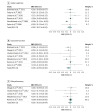Association of Sleep-Disordered Breathing With Cognitive Function and Risk of Cognitive Impairment: A Systematic Review and Meta-analysis
- PMID: 28846764
- PMCID: PMC5710301
- DOI: 10.1001/jamaneurol.2017.2180
Association of Sleep-Disordered Breathing With Cognitive Function and Risk of Cognitive Impairment: A Systematic Review and Meta-analysis
Erratum in
-
Omitted Funding Information.JAMA Neurol. 2018 Jan 1;75(1):133. doi: 10.1001/jamaneurol.2017.3677. JAMA Neurol. 2018. PMID: 29159415 Free PMC article. No abstract available.
Abstract
Importance: Growing evidence suggests an association between sleep-disordered breathing (SDB) and cognitive decline in elderly persons. However, results from population-based studies have been conflicting, possibly owing to different methods to assess SDB or cognitive domains, making it difficult to draw conclusions on this association.
Objective: To provide a quantitative synthesis of population-based studies on the relationship between SDB and risk of cognitive impairment.
Data sources: PubMed, EMBASE, and PsychINFO were systematically searched to identify peer-reviewed articles published in English before January 2017 that reported on the association between SDB and cognitive function.
Study selection: We included cross-sectional and prospective studies with at least 200 participants with a mean participant age of 40 years or older.
Data extraction and synthesis: Data were extracted independently by 2 investigators. We extracted and pooled adjusted risk ratios from prospective studies and standard mean differences from cross-sectional studies, using random-effect models. This meta-analysis followed the PRISMA guidelines and also adhered to the MOOSE guidelines.
Main outcomes and measures: Cognitive outcomes were based on standard tests or diagnosis of cognitive impairment. Sleep-disordered breathing was ascertained by apnea-hypopnea index or clinical diagnosis.
Results: We included 14 studies, 6 of which were prospective, covering a total of 4 288 419 men and women. Pooled analysis of the 6 prospective studies indicated that those with SDB were 26% (risk ratio, 1.26; 95% CI, 1.05-1.50) more likely to develop cognitive impairment, with no evidence of publication bias but significant heterogeneity between studies. After removing 1 study that introduced significant heterogeneity, the pooled risk ratio was 1.35 (95% CI, 1.11-1.65). Pooled analysis of the 7 cross-sectional studies suggested that those with SDB had slightly worse executive function (standard mean difference, -0.05; 95% CI, -0.09 to 0.00), with no evidence of heterogeneity or publication bias. Sleep-disordered breathing was not associated with global cognition or memory.
Conclusions and relevance: Sleep-disordered breathing is associated with an increased risk of cognitive impairment and a small worsening in executive function. Further studies are required to determine the mechanisms linking these common conditions and whether treatment of SDB might reduce risk of cognitive impairment.
Conflict of interest statement
Figures


References
-
- Nieto FJ, Young TB, Lind BK, et al. Association of sleep-disordered breathing, sleep apnea, and hypertension in a large community-based study: Sleep Heart Health Study. JAMA. 2000;283(14):1829-1836. - PubMed
-
- Young T, Peppard PE, Gottlieb DJ. Epidemiology of obstructive sleep apnea: a population health perspective. Am J Respir Crit Care Med. 2002;165(9):1217-1239. - PubMed
-
- Kasai T, Floras JS, Bradley TD. Sleep apnea and cardiovascular disease: a bidirectional relationship. Circulation. 2012;126(12):1495-1510. - PubMed
-
- Haas DC, Foster GL, Nieto FJ, et al. Age-dependent associations between sleep-disordered breathing and hypertension: importance of discriminating between systolic/diastolic hypertension and isolated systolic hypertension in the Sleep Heart Health Study. Circulation. 2005;111(5):614-621. - PubMed
Publication types
MeSH terms
Grants and funding
LinkOut - more resources
Full Text Sources
Other Literature Sources
Medical

